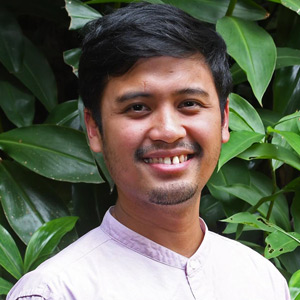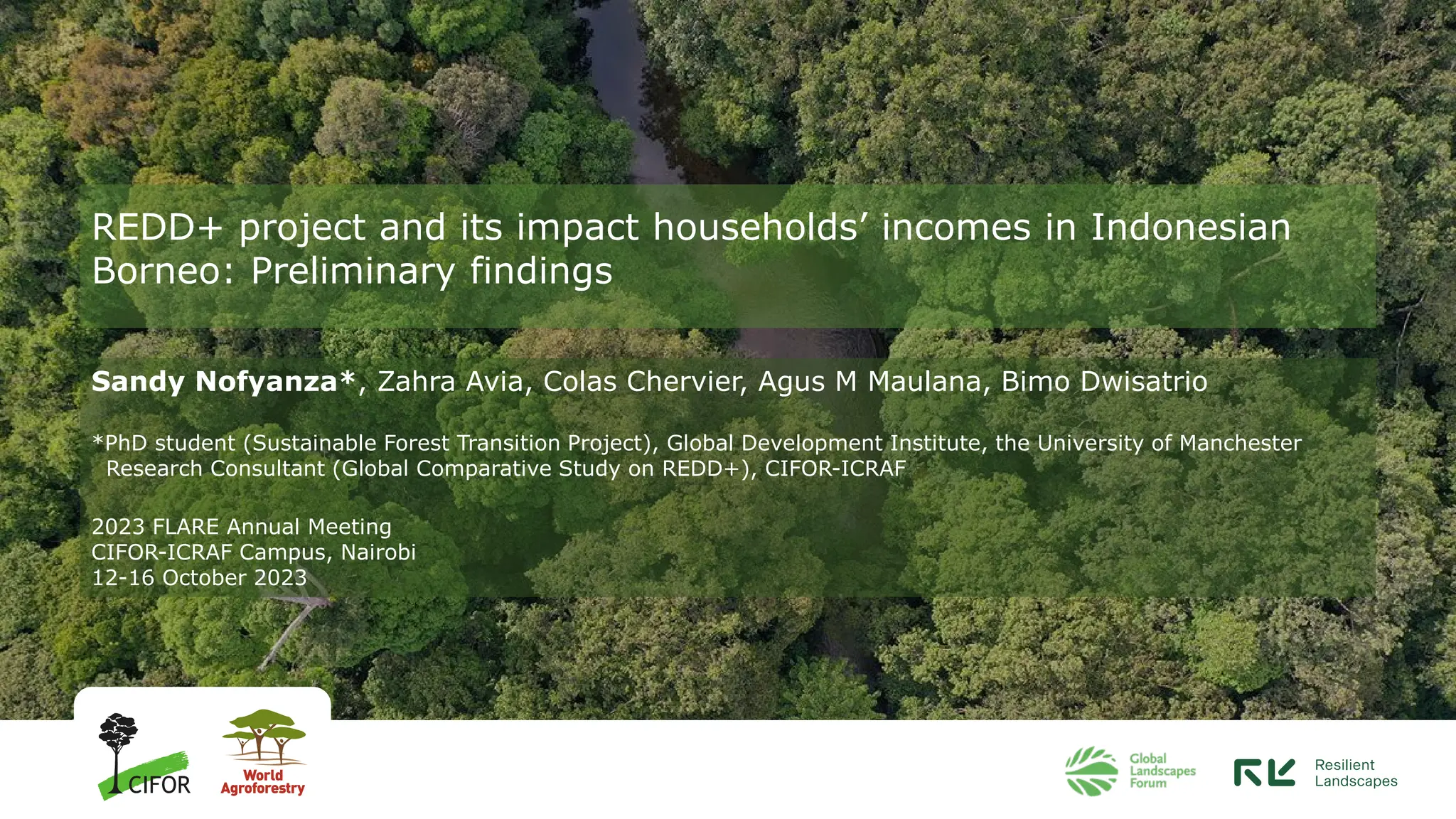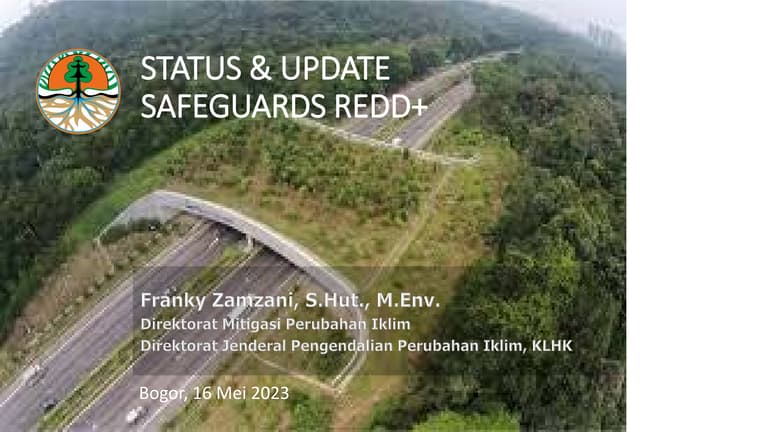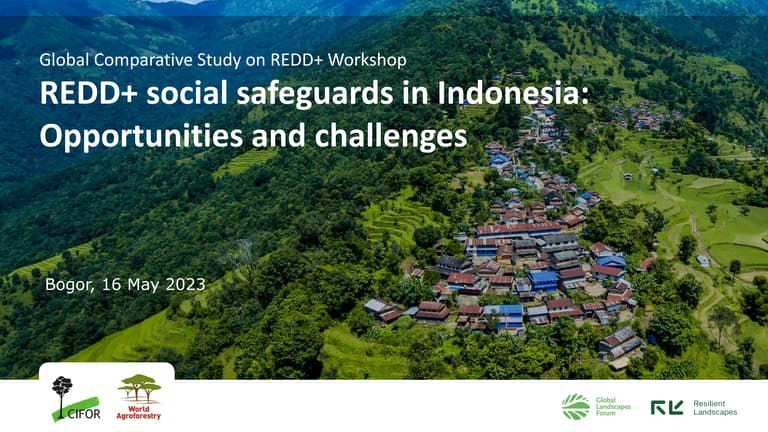GCS REDD+ has been implemented in Indonesia since 2009. Building on CIFOR’s contributions to Indonesia’s climate change efforts, Phase 4 of GCS REDD+ will continue to strengthen collaboration with government agencies, including the Directorate General of Climate Change (DJPPI) and the Forestry and Environmental Research, Development and Innovation Agency (FOERDIA) under the Ministry of Environment and Forestry; civil society and related coalitions; universities, including the Research Center for Climate Change – University of Indonesia (RCCC-UI) as the main partner; and private-sector partners in the country. The aim will be to address priority issues related to REDD+ measurement, reporting and verification (MRV), peatlands, finance, safeguards and benefit sharing. We will leverage our work on REDD+ policy and forest reference emission levels to help produce the diagnostic framework and future emission scenarios. Through work package activities, we will assess the following policy-relevant initiatives: (i) innovative finance mechanisms, including the Environmental Fund Management Agency (BPDLH) and IEF, the emerging domestic forest carbon market, as well as other public and blended financing schemes; (ii) benefit sharing from results-based payments for reducing deforestation; (iii) the Forest Carbon Partnership Facility’s REDD+ pilot program in East Kalimantan province; and (iv) safeguard options and perceptions at the national level and in East Kalimantan and Jambi provinces.
Partners
- Research Center for Climate Change – University of Indonesia (RCCC-UI)
Events
REDD+ social safeguards in Indonesia: Opportunities and challenges
Workshop Series – Visiting lecture: Taking local context into account in REDD+ policy implementation
Science and Policy Dialogue IV: Taking local context into account in REDD+ policies implementation
Lessons learned from REDD+ progress in 8 countries and the way forward
Work package 1: Achieving transparency and accountability
The research in work package 1 aims to support and engage Indonesian national and subnational stakeholders in enhancing transparency and accountability in the forest and land-use sector. Transparency is the backbone of the UNFCCC and the Paris Agreement, and greenhouse gas inventories are essential inputs to the Global Stocktake to determine whether countries are collectively achieving their goals. Toward achieving this objective, CIFOR and partners will implement the following biophysical- and governance-oriented activities:
- Identify the main drivers, patterns, and processes that shape social-ecological systems and co-determine socioeconomic and environmental outcomes of tropical deforestation and forest degradation.
- Consolidate CIFOR’s research on peatlands and C-rich mangroves to support the government in developing Tier 2 emission factors with special attention to emissions from fires, forest degradation, and oil palm-driven deforestation.
- Organize a series of meetings and workshops with government agencies and key stakeholders for capacity-building activities, data exchange, and discussions for the UNFCCC TACCC (Transparency, Accuracy, Completeness, Comparability, Consistency) accounting improvement.
The information generated in this WP will inform the assessment of carbon performance of different intervention types undertaken in WP2 and future emissions scenarios generated in WP4.
Work package 2: Tracking and assessing actions
For tackling deforestation in Indonesia, we need the right tools in the right place. We want to answer: ‘What works where and why?’
Deforestation caused by smallholder’s slash and burn practices needs to be handled differently compared to deforestation caused by large-scale agricultural commodity conversion. We will use our knowledge on impact evaluation, REDD+ policies, and interventions implemented by the government, private sector, and civil societies in Indonesia and around the world, combined with data we have gathered since 2010 from 5 REDD+ projects and 1 jurisdictional REDD+ initiative in Indonesia.
Our hope is that by 2022, we can develop a matrix that shows which policy is most effective in what kind of deforestation condition.
We also know that tackling deforestation can bring benefits and burdens. We want to answer, “How can we share the benefits and burdens more equitably?”
This is a very big question, so we need to start taking small bites. We will start by being more clear about what are the REDD+ benefits and burdens, and the formal processes they are distributed. Indonesia has built an impressive array of institutions and regulations that influences this process, involving many stakeholders within and beyond forestry. It’s not so easy to understand them all. We will also share what we know about REDD+ benefit and burden sharing from around the world, through a ‘knowledge tree’. Each branch is an issue that needs to be addressed, and each leaf is a piece of scientific knowledge or local experience that can help us address it. The tree is in English and will be updated and translated into Indonesian in 2022.
Work package 3: Bringing out the politics: understanding and enlarging the policy space
The research in work package 3 aim is to identify opportunities for, and barriers to, transformational change related to governance and the political economy of forests including the rights and livelihoods for women, indigenous peoples, and local communities in global, national and subnational policy arenas. For REDD+ to be successful, a transition away from the forces that drive, maintain and intensify business-as-usual deforestation and forest degradation is needed, both within and beyond the forestry sector, and far beyond the policy domains of tropical countries where deforestation takes place. This work package includes two main sets of activities:
- Analysis of the politics of continued deforestation and forest degradation including the global political economy of deforestation and the underlying power relations in decision-making over forest lands in the Global South; the governance of global forest carbon finance; and changing domestic REDD+ policy domain structures.
- Production of scientific evidence, guidelines, and tools on Rights-Based Approaches (RBA) to support more equitable forms of environmental governance (focus on the rights of IPLCs and women) with transformational potential, including adherence to ambitious safeguards standards, effective grievance mechanisms, equitable benefit-sharing arrangements and socially-inclusive participation, and forest friendly initiative; safeguards action plans; self-reflection monitoring tool.
In WP3, ‘enlarging the policy space’ means supporting processes of change and building policy learning to promote forest-friendly policies and the rights of women, indigenous peoples, and local communities. ‘forest-friendly policies’ means the need to balance competing policy objectives and stakeholder interests to promote transformational change and create new opportunities for what is politically legitimate and feasible. ‘Transformational change’ means forests require shifts in power relations, economic incentives, and discourses in favor of standing forests, and the people living in and near them. In Indonesia, forest-friendly policies resulted in the lowest point of deforestation rate in the 2019-2020 period by 75.03% reduction. However, our understanding of how to achieve transformational change in favor of forest-friendly policies is still limited. Knowledge generated and findings from WP3 will be used as inputs and validated in WP4 activities and fed into the overall diagnostic framework to inform national safeguards in REDD+ and related activities.
Work package 4: Linking science, policy and politics for forest-based climate action
This work package 4 objective is to draw on the results produced in the previous packages to co-develop, apply and refine a deforestation and forest degradation framework (‘diagnostic framework’), combined with policy scenarios of alternative forest and development pathways, with key stakeholders through science-policy platforms in each of the four priority countries.
This work package will seek to establish consensus in these workshops through the production of summary reports, authored by scientists but discussed and informally approved by policymakers (inspired by IPCC’s Summary for Policy Makers). These tools will support policymakers and practitioners in designing and implementing 3E policies and actions – including to secure local rights and livelihoods – that are aligned with their unique contexts and also respond to the stipulations under the Paris Agreement.
We hypothesize that if in-country stakeholders understand the climate and development prospects and trade-offs of different forest-friendly policies and actions, they will be more willing to invest in natural climate solutions that make sense for their national development plans and NDCs.
Work package 5. Sharing evidence and experiences
This work package 5 objective is to disseminate the scientific knowledge generated by CIFOR and partners in the four work packages and promote the participation of forest stakeholders. In Indonesia, a wide range of communication outputs have been tested in this country and will be continued to be produced. This includes the successful podcasts shared in Indonesian and disseminated across social media platforms. Select interactive multimedia packages will be translated and featured in a knowledge portal on the GCS REDD+ website in Bahasa Indonesia.
>
- The necessity to identify key messages, target audiences, and a set of communication activities and products for the project
- Communication output summarizes the digital, media, audio-visual, printed, and event tools and channels that will be used throughout the project’s duration
Latest knowledge products
Publications
Forests News
Presentations
Videos
Contact details
Bimo Dwi Satrio
Email: b.dwisatrio@cgiar.org
CIFOR headquarters
Jalan CIFOR
Situ Gede, Bogor Barat
Bogor 16115
Indonesia
Telephone: 62-251-8622-622
Fax: 62-251-8622-100
Email for general inquiries:

















